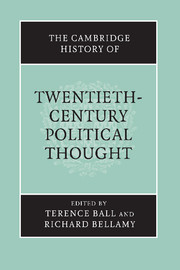Book contents
- Frontmatter
- Editors’ introduction
- Part I The changing fortunes of liberal democracy
- 1 The coming of the welfare state
- 2 Politics and markets: Keynes and his critics
- 3 The advent of the masses and the making of the modern theory of democracy
- 4 Nationalism and imperialism
- 5 Fascism and racism
- 6 Conservatism
- 7 Christian democracy
- 8 Critics of totalitarianism
- 9 The end of the welfare state?
- Part II Varieties of Marxism
- Part III Science, modernism and politics
- Part IV New social movements and the politics of difference
- Part V Beyond Western political thought
- Biographies
- Bibliography
- Subject index
- Name index
- References
7 - Christian democracy
from Part I - The changing fortunes of liberal democracy
Published online by Cambridge University Press: 28 March 2008
- Frontmatter
- Editors’ introduction
- Part I The changing fortunes of liberal democracy
- 1 The coming of the welfare state
- 2 Politics and markets: Keynes and his critics
- 3 The advent of the masses and the making of the modern theory of democracy
- 4 Nationalism and imperialism
- 5 Fascism and racism
- 6 Conservatism
- 7 Christian democracy
- 8 Critics of totalitarianism
- 9 The end of the welfare state?
- Part II Varieties of Marxism
- Part III Science, modernism and politics
- Part IV New social movements and the politics of difference
- Part V Beyond Western political thought
- Biographies
- Bibliography
- Subject index
- Name index
- References
Summary
‘Christian democracy’ can generally be understood as the strategy whereby practising Christians, the majority of them Catholic, met both the challenges and opportunities presented by contemporary political societies and states. During its initial phase, Christian democracy constituted the Catholic church’s response to the advent of mass politics and the secular and socialist collectivist movements that first raised the ‘social question’. Then it came more or less to coincide with the branch of Catholic political thought that sought to reconcile Catholicism to the pluralist and democratic state. Finally, Christian democracy turned into the dominant, and successful, form of political Catholicism – the doctrine chosen by those Catholics who accepted that there should be a free competition for power, and sought to defend their ideas and interests and ensure the implementation of their programmes.
The experience of participating in various types of associations and trade unions led Catholics to organise themselves into political parties which both attracted an increasingly broad consensus and became ever more powerful. The exercise of power meant their initial purpose of winning back both state and society for Catholicism gradually gave way to the pragmatic management of the prevailing problems, especially among those parties that ruled certain European countries for long periods. Despite becoming more secular and habitually adopting a centre-right stance, Christian Democratic parties nevertheless remained faithful to certain aspects of their original programmes. These allegiances differentiated them from the various conservative parties, even if, like them, Christian Democrats opposed leftist or socialist parties.
- Type
- Chapter
- Information
- The Cambridge History of Twentieth-Century Political Thought , pp. 165 - 180Publisher: Cambridge University PressPrint publication year: 2003
References
- 4
- Cited by

